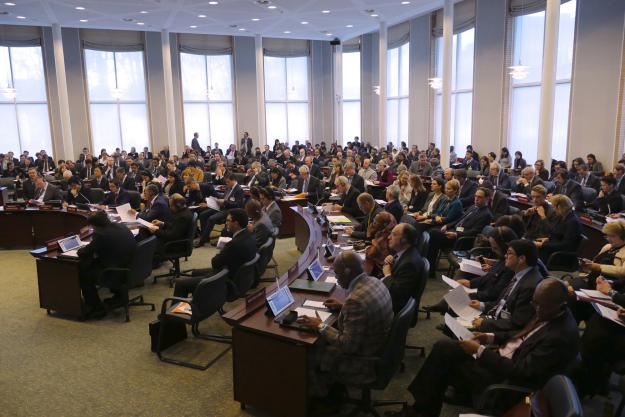
A meeting of the OPCW Executive Council.
THE HAGUE, Netherlands — 19 April 2017 — The Executive Council of the Organisation for the Prohibition of Chemical Weapons (OPCW) reconvened today to further address the allegation of chemical weapons use in the Khan Sheikhun area of southern Idlib in the Syrian Arab Republic. OPCW’s Director-General, Ambassador Ahmet Üzümcü updated Council members on recent developments regarding the OPCW Technical Secretariat’s activities.
Ambassador Üzümcü underscored that the Fact-Finding Mission (FFM) continues its work using procedures and methodologies consistent with its mission and reaffirmed that the FFM has been endorsed by the relevant decisions of the Executive Council and applicable resolutions of the UN Security Council. He reiterated his full confidence in the professionalism and impartiality of colleagues comprising the Fact-Finding Mission teams.
The bio-medical samples collected from three victims during their autopsy were analysed at two OPCW designated laboratories. The results of the analysis indicate that the victims were exposed to Sarin or a Sarin-like substance. Bio-medical samples from seven individuals undergoing treatment at hospitals were also analysed in two other OPCW designated laboratories. Similarly, the results of these analyses indicate exposure to Sarin or a Sarin-like substance.
Director-General Üzümcü stated clearly: “The results of these analyses from four OPCW designated laboratories indicate exposure to Sarin or a Sarin-like substance. While further details of the laboratory analyses will follow, the analytical results already obtained are incontrovertible.”
In the meantime, the Fact-Finding Mission is continuing with interviews, evidence management and sample acquisition. The Director-General reported that an FFM team is ready to deploy to Khan Sheikhun should the security situation permit. He reminded the Executive Council of the 27 May 2014 attack on an FFM team and the action the Council subsequently took in emphasising the importance of safety and security of OPCW experts deployed to Syria.
The FFM is still anticipated to complete a first report of its findings to be submitted to States Parties of the Chemical Weapons Convention within two weeks and the Director-General will make the report available to the OPCW-UN Joint Investigative Mechanism.
Ambassador Üzümcü repeated his request for the continued support of all States Parties, including through the provision of relevant information, to ensure that the Technical Secretariat is able to pursue its work, and to allow it to fulfil the OPCW mission within a reasonable time frame.
The Executive Council decided to reconvene tomorrow, 20 April, to vote on a draft decision under discussion.
Background
The OPCW Fact-Finding Mission initiated its work on 5 April 2017 after the Technical Secretariat’s preliminary assessment that the 4 April incident was a credible allegation. The FFM is led by, and predominately comprised of, experienced and impartial inspectors with support from experts from various units across the Technical Secretariat.
OPCW Designated Laboratories
The OPCW has been organising and conducting Official Proficiency Tests since 1996. Under the provisions of the CWC, the purpose of these tests is to certify laboratories for the analysis of authentic samples. As a result of efforts by the OPCW and States Parties spanning many years, it became possible to build-up an open-ended network of OPCW Designated Laboratories.
OPCW Designated Laboratories are a lynchpin of the Organisation’s verification regime and its capacity to investigate possible violations of the Convention. They must be able to perform off-site analysis of chemical samples collected by OPCW inspectors from chemical production facilities, storage depots and other installations, or from the site of an alleged use of chemical weapons, and provide forensic proof if a violation of the Convention has occurred. These laboratories offer the necessary assurance to our States Parties that chemical analyses needed to make determinations or to clarify issues occurring during OPCW inspections are carried out competently and with unambiguous results.
The Proficiency Tests are conducted on a twice-yearly basis and are open to all interested laboratories from OPCW Member States. Applicants need to achieve high scores on three consecutive tests to be awarded the status of Designated Laboratory. There are currently 18 OPCW Designated Laboratories in Europe, Asia and the United States of America.
More Information
- National Statements and Other Documents for the Fifty-Fourth Meeting of the Executive Council
- OPCW Executive Council
- OPCW Fact Sheets
